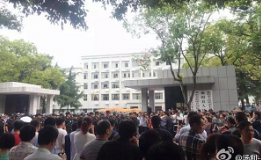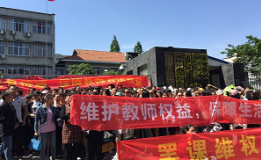China’s teachers continue the fight for decent work

More than 1,000 elementary and middle school teachers from all over Hengyang county in Hunan protested at the county government building on 3 May demanding years of unpaid wages, benefits and social insurance contributions.
Protests continued the following day, the anniversary of the May Fourth Movement. Hundreds of police arrested more than ten teacher representatives, one for reportedly leading the teachers in the national anthem, and another for accepting an interview with the media. Teachers held support demonstrations for those taken to detention centers. Even when some of those arrested were officially released by police, two teachers refused to leave prison, demanding an explanation from the government.
In an online poll by Sogou News, 94 percent of the nearly 40,000 respondents felt that the teachers had no choice but to take action, while only four percent believed teachers should have used more “reasonable” methods.

Hundreds of elementary and middle school teachers went on strike for two days in mid-May in Tongcheng county, Hubei, protesting abysmally low pay. Teachers from across the county held a sit-in at the county government building, stretching protest banners across the front gate. Police arrived on the scene though no confrontation occurred.
In an open letter, the teachers listed ten grievances, ranging from a lack of rural area subsidies to under contribution of social insurance. Their central complaint, however, was their shockingly low wages. Several teachers circulated their banking receipts showing their take home pay for the previous month was as low as 300 to 500 yuan.
A Radio Free Asia interview with Tongcheng teachers revealed that the situation was even worse for younger teachers, many of whom had not received medical insurance cards and relied on money borrowed from their parents just to get by.
